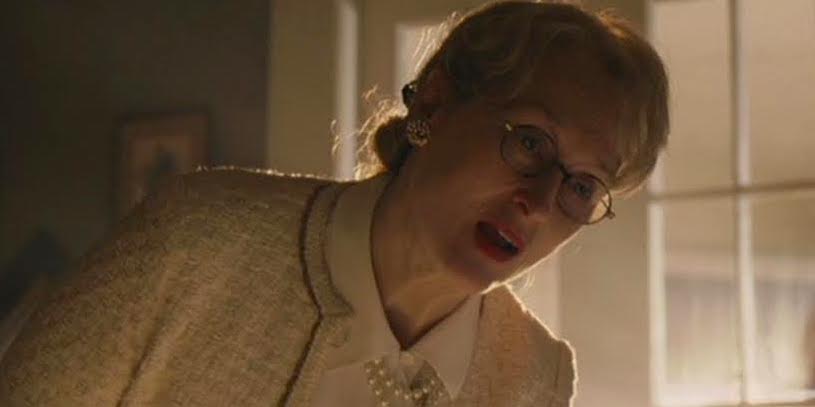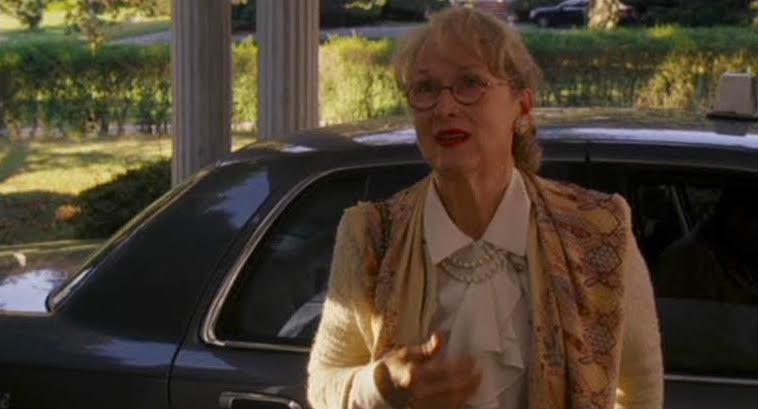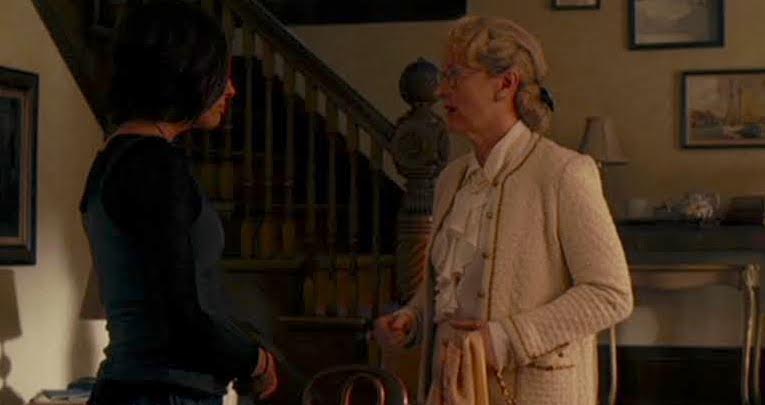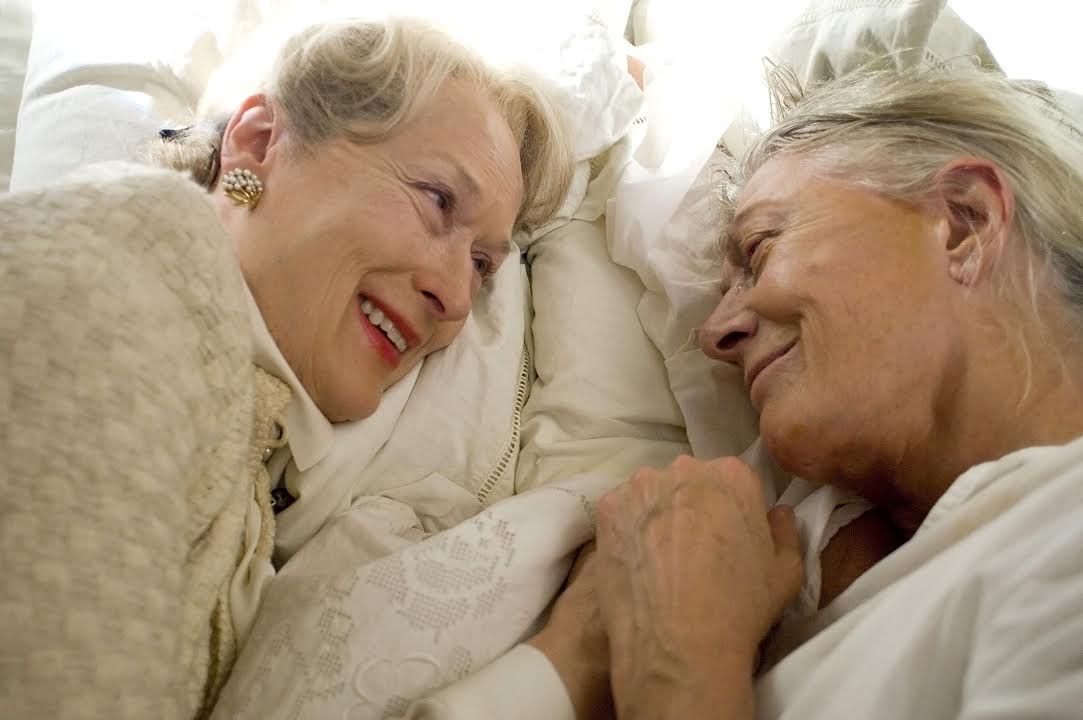John and Matthew are watching every single live-action film starring Meryl Streep.

#36 —Lila Ross, an old friend of a dying woman.
JOHN: While Meryl Streep is fiercely protective of her and her family’s privacy, she made no secret about what she got her daughter Mamie Gummer for her 24th birthday: Lajos Koltai’s Evening. Adapted from Susan Minot’s 1998 novel by the author herself, along with writer Michael Cunningham (The Hours), Evening follows Vanessa Redgrave’s Ann, an elderly woman drifting in and out of consciousnesses on her deathbed as she recalls a distant memory from her long-ago youth. That memory stars Claire Danes as a twentysomething Ann on the day of her best friend Lila’s (Mamie Gummer) wedding to a man she does not love. Ann, Lila, and the latter’s brother Buddy (Hugh Dancy) are instead infatuated with Harris (Patrick Wilson), a strapping doctor that each will either screw or regret not screwing...
Lajos Koltai, an Oscar-nominated cinematographer for Malèna in his second film as a director, fails to ignite the excitement of his tony cast. Actors play stock roles with varying credibility (Claire Danes as a Greenwich Village chanteuse?), all human specificity prune-dried in Minot and Cunningham’s script. The film’s flashback structure and languid pace turn an essentially simple story about the regret of lost love into a punishing ordeal.

Nearly an hour and a half passes before, thankfully, Streep shows up for a ten-minute cameo as the older version of Lila to visit her dear friend Ann on her deathbed. Streep is first greeted by Ann’s daughters, played by Toni Collette and the late Natasha Richardson, as she steps out of her cab, looking conservatively subdued in a white suit. Streep marches straight upstairs and lays down in bed with her friend for a long-delayed reunion. In hushed whispers and through watery eyes, the pair recollect the “mistakes” they have made, the love they have forfeited, and the different paths they instead forged. Although they have previously appeared in only one film together (1977’s Julia, in which they shared not a single scene), Redgrave and Streep conjure an entire shared history in these few minutes. While Ann is tormented by her regrets, Streep succinctly tells her, “I think we did what we needed to do,” gazing at Redgrave with a look full of love and compassion. Although the conversation, like the film, is dominated by talk about one man (Harris), Streep will later join Collette downstairs and respond to her queries about Harris by reminding her that Ann’s life was so much richer, deeper, and more mysterious than this one rendezvous could explain. And as quickly as Streep appears, she’s gone.
Streep’s cameo is, unsurprisingly, one of the few bright spots in this drab and tedious film; she and Redgrave, true masters of their craft, know how to cut right to the feeling of a scene. Their intimacy far outstrips that of their flashback counterparts and suggests a better film buried somewhere within this one.

MATTHEW: Evening is hindered by too many factors to name, but here are just a few: vague scenarios, flimsy relationships, talented but inconsistent actors (including a dead-eyed Glenn Close as Lila’s mother), a groaner of a Bury Your Gays climax, slick period aesthetics, and blindingly overlit photography better suited to the glossy pages of an in-flight magazine. Far too many moments register as actors simply reciting speeches with nary a fiery, unplanned feeling in sight. Danes fares worst of all, proving painfully dull and wholly unconvincing as, of all things, a free-spirited bohemian. There are certain, momentary exceptions to this monotony and they derive from exactly the actors you expect. As Redgrave’s younger daughter, a caustic, kohl-eyed Collette breaks through the polish to play a believable character rather than a series of traits. And then there’s Redgrave, who has seldom met a part she couldn’t salvage nor a prosaic piece of dialogue she couldn’t reinvigorate with her mesmeric emotional intuition. When the actress’ eyes alight with terror and tenderness, they bore beneath the veneer of the film and give it something like a soul.
Koltai films Redgrave’s conversation with Streep as nothing less than a triumphal meeting of two screen luminaries, but the actresses nail their split scene precisely because they shrug away the off-screen magnitude of this passage and opt instead for a casual intimacy befitting of their characters’ shared history and separate paths of life. Together, they access suppressed pains without any of the self-regard that cripples so many of the performers who surround them. Streep, costumed by Ann Roth in pearls and dress suit so as to resemble a retired First Lady, is interestingly frugal with her stock gestures, never fully opening up her vault of buried memories to Redgrave but still suggesting a mute concern behind her patrician composure.

Streep’s performance is far too brief to analyze in any greater depth, but the actress does enough with the meager material afforded her to at least leave a mark. When Streep, in her final scene, played opposite Collette, reflexively pushes her scene partner’s hair from her face and later pats her cheek while ruminating on the sacrifices that are made even in the fullest of lives, she offers something like a condensed lesson in how the greatest actors can find a pulse in almost any script, or at least offer their own in its absence.